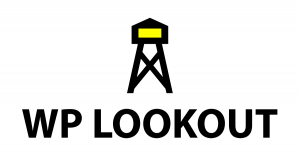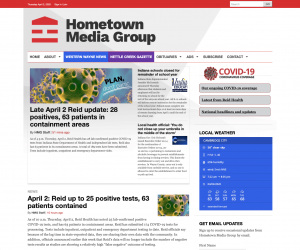It's been about four months since I became owner and publisher of my community's local print newspaper. In the spirit of transparency and working out in the open, we recently shared our first report to the community about our operations, health and future plans. I also geeked out a bit with a blog post on some of the tools and technology we're using to run the paper.
I'd like to say a little more about what it's been like for me personally.
To sum it up: I'm loving it!
As I said when announcing this adventure, "this is a thrilling opportunity to continue exploring my interest in the questions of where and how people get their information, and what informs the decisions they make about their lives, values and communities." It has been exactly that. From the people involved to the details of getting the paper out the door each week to the writing, editing and publisher decision-making processes to the bigger questions of our role in the community and how best to meet people's information needs, it's all been thrilling.
One thing that's surprised me a bit is how much love there is for the Western Wayne News newspaper.
I knew that our team and the paper's previous owners Brenda and Jim had built a lot of goodwill in the community over the years. And I knew that the paper had a loyal readership that takes the paper very seriously. But I had no idea just how strongly people feel about the paper as an important part of their lives! They call us just to say how much they like the paper. They write the nicest notes to accompany their renewal payments. If it doesn't show up in their mail, they call us right away. They fawn over stories. They notice little changes. They ask about our health and growth, and wonder about ways they can help get the word out. Not just once in a while..almost every day. It's amazing and humbling.
(I will admit that after several years in my journalism degree program of studying the declining public appreciation for the value of journalism and local news, I may have brought some cynicism with me about this. I was ready to work hard to make the basic case for the existence of a local newspaper and quality news reporting. But so far, I haven't had to; people seem to get it. There are a lot of things contributing to this and I'm sure there are still many folks out there who might benefit from some persuasion in that regard, but it's been a relief and a wonder to feel like I'm swimming with the current instead of fighting against it.)
The weirdest part of the whole experience is when I'm talking to someone or wandering around town and I see or think of something that might be interesting, useful or newsworthy to the community, and have the thought "somebody should get the word out about that." Then, I realize that the "somebody" is probably us. 😃 It's also been surreal to be at this particular moment in the history of our local news ecosystem, where the daily Gannett paper that I have read, contributed to, analyzed, criticized (reminder to self: buy Jason, Bill and others a beer soon) and closely followed for so many years has effectively paused its news coverage indefinitely. Barely a day goes by without a call from someone lamenting its decline and subscribing to our paper to try to fill that space.
A few people have asked me about how much of an investment this new venture has been. I think the question behind their question is about the sustainability of newspaper ownership, both financially and personally. A few things about that:
I'm not sharing the price I paid for the newspaper as that gets into parts of the story that aren't mine alone to tell. I was told that I paid more than "the market" might strictly suggest this particular newspaper is worth. If so, I did that because after a significant amount of due diligence work, I felt confident in the paper's value, its importance to the community and the opportunities it presented as a foundation for growth over time. Not just growth in revenue, but growth as a hub for community health and civic engagement, To me, as someone who cares deeply about the future of this place, that is worth a lot.
Is it profitable?
If you look at the numbers we shared in the 2022 Q4 community report, you'll see that at a basic level we have more income than expenses. Yay, right? For now, this is possible because I'm paying myself the lowest wage of any of our regular employees, and because our employees, contractors and contributors work incredibly hard for the wages they are paid. I have already made some progress on raising compensation, with plans to further increase that over time in a way that's sustainable for all of us. Beyond that, the purchase price financing terms also affect what happens to any remaining profit, at least for a while. So a snapshot of one quarter indicates that we're in a good place, but there are a lot of other factors that will determine if we can be profitable in the longer term.
Have there been challenging parts?
Oh yes. I enjoy working with my colleagues but going from a fully distributed/remote work life to one that involves an hour of commuting each day has been a big change. Our newspaper production process alone is currently spread across all 7 days of the week, let alone all of the other business management and growth tasks I'm handling, so I've given up a fair amount of family and personal time. As much as I feel at home managing a business and a team, there are the stresses and worries that come with that. There are days when I just want to get one particular thing done and instead end up working on a plumbing or power or rodent issue. And so on. But, I'm fortunate that these are mostly all challenges of my own choosing, and that I do not have to tackle them alone.
Speaking of, there's a lot of gratitude to express:
To the team at the paper that I get to work with every day, who have navigated a time of transition and uncertainty by doing their best to welcome me with kindness, embraced the opportunity to try new things, and made sure I know what their work and the paper as a whole mean to its readers and subscribers. To the long-time readers of the paper for being open to the idea that new ownership could actually work out okay. To Brenda McLane for all of the time she spent making sure this "succession" and transition went smoothly, and continuing to cheer us on after. To my family for being understanding and flexible as I figured out a new schedule, routine and work life, and for being excited for me at every step of the way. To my friends and wider community for cheering me on and offering their support. And to the many others who have shared a kind word. Thank you all.


